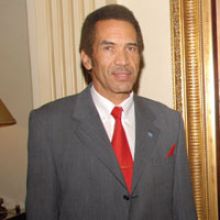Khama's First Date With Death Penalty
By Lekopanye Mooketsi
Correspondent
| Monday July 28, 2008 00:00


Tsobane was sentenced to death by the Francistown High Court after he was convicted of killing his 10-year-old daughter in 2004 to avoid paying for her maintenance. He pleaded guilty to a charge of murder. Last week, the Court of Appeal sitting in Lobatse, upheld the death sentence, which was imposed by the High Court. In dismissing the appeal, the court found that there were no extenuating circumstances in Tsobane's case.
Tsobane can now only apply to the President for mercy. His lawyer, Tony Matilo, said this is the only option they are left with. This will be the first application for clemency by a death row inmate to Khama since he took power in April.
Tsobane appealed against his death sentence, saying that there were extenuating circumstances that reduced his moral guilt and the High Court erred in finding otherwise. He wanted the death sentence to be set aside and replaced with a prison sentence. Tsobane was the last person seen with the deceased who was on her way to school on the morning of January 20, 2004. He took her in his car but later that day, two people saw the little girl's motionless body in the bush. The police found the deceased kneeling on her knees with a cable around her neck tied to a tree.
Tsobane was arrested the following day and he made a confession statement before a judicial officer. In his evidence he said that he had pleaded guilty to the offence because 'I was drunk and had smoked dagga'. He attributed his intoxicated state to the fact that he was hurt by the mother of her daughter as she had told him a week earlier that he was a fool because he was supporting a child who was not his.
However, the state produced a death certificate, which showed that the mother of Tsobane's daughter, had died two years before the incident. The Court of Appeal ruled that Tsobane told the trial court a blatant untruth in claiming that he killed his daughter because her mother teased him.
In his confession statement, Tsobane had stated: 'I have killed a child. I killed the child in an attempt to avoid liability in order to do away with my indebtedness. I was trying to do away with maintenance arrears. I was trying to do away with the liability by killing the child because it was too high. I think that is all. I killed the child by strangling it with a rope. I think that is all I did.'
Tsobane was obliged to pay P40 a month for maintenance for his daughter. But he had paid nothing since 1994.
Judge President of the Court of Appeal, Patrick Tebbutt, said the evidence makes it clear that Tsobane was in serious arrears with his obligation to pay P40 per month. He said there was also evidence that Tsobane's wife was becoming difficult about the fact that he does not have money. 'Those factors explain, in my view, why he killed the deceased,' the Tebbutt said. 'It is obvious that because of his financial situation and his problems with her maintenance, he decided to do away with her, what he seems to have regarded as the cause of those problems.'
The Court of Appeal ruled that this leads to the irresistible inference that the killing of the deceased was premeditated. The court noted that Tsobane was not so much intoxicated to render him not conscious of his actions as he claimed.
The court said he could have alleviated his debts to some extent by selling his car. 'He did not do so. He had, apparently, never paid any maintenance for the deceased, so even that had nothing in reality to do with her. Why then kill her, in order to get rid of his liabilities?' wondered Tebbutt.
'The murder of this innocent child was most brutal. Strangulation is a particularly violent and brutal method of killing a person and this was a defenceless 10-year-old-girl, who must have trusted the appellant as her father. Anxiety over one's financial situation can never be a justification for the brutal killing of an innocent defenceless 10-year-old child,' the judge said.
